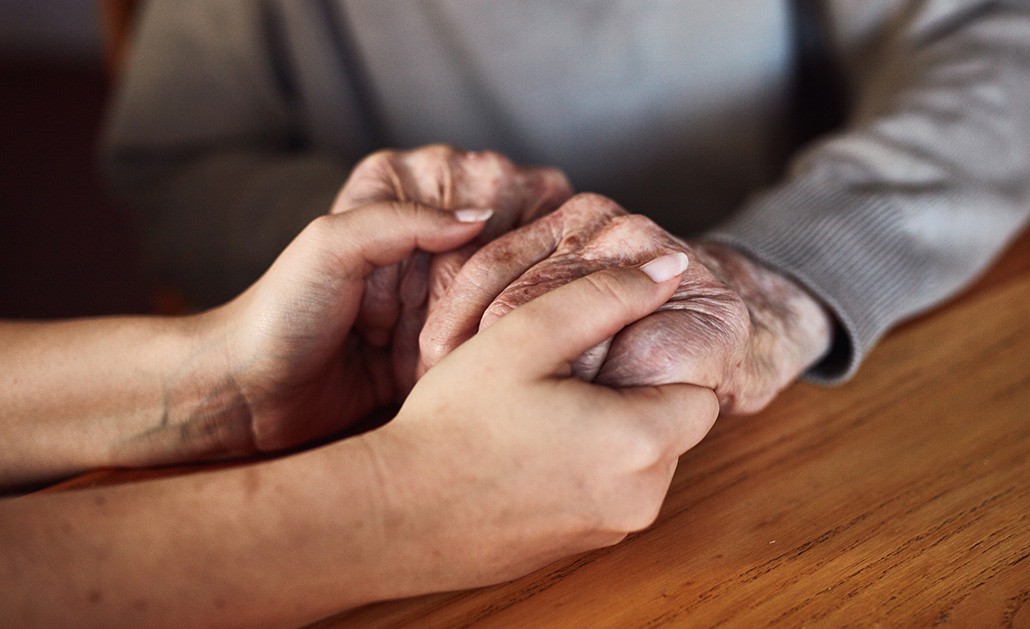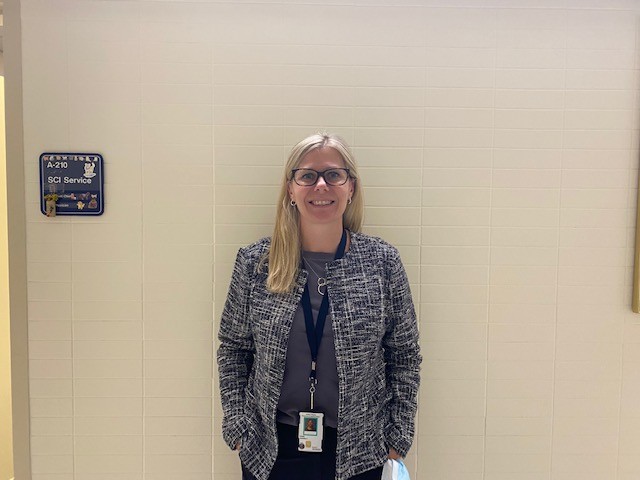
A friend holds the hand of an older adult to provide support. Photo by iStock.
As a nationally certified American Sign Language interpreter, JoAnna Rowe often worked with older patients in hospitals across Massachusetts.
During that time, she developed a strong affinity for older adults, the fastest growing segment of the population in the United States. And, she says, she realized that she wanted to play a more active role in supporting their health.
People 65 and over face a disproportionate risk of cancer, heart disease, and type 2 diabetes.
“I recognized that I had a voice,” says Rowe, who plans to graduate from the Boston College School of Social Work in May. “I saw the barriers that older adults face within the healthcare system for years, and I realized that I had a lot to offer.”
Rowe graduated from a certificate program in healthcare interpreting at the Rochester Institute of Technology in 2015 and enrolled in the School of Social Work in 2018. She focuses her studies on older adults and families and was one of five students selected to take part in the Spier Fellows in Aging program during the 2020-2021 academic year.
The program, led by associate professor Christina Matz, prepares social workers to support the health and well-being of the rapidly aging population.

JoAnna Rowe
Spier Fellows receive $3,000 stipends, get mentored by retired social workers who specialized in the care of older adults, and attend seminars from experts in the field. One recent presentation focused on dementia, which will likely affect more than 14 million adults 65 and over by 2050.
Spier Fellows also have access to a range of career paths through internships in Greater Boston. Rowe interns at the Spinal Cord Injury and Disorders Center at the Veterans Affairs Hospital in West Roxbury, which helps veterans live healthy and independent lives.
Rowe works with an interdisciplinary team, supporting older patients who served in the Korean and Vietnam wars. She assesses the psychological health of patients, ensures that they have support from caregivers after they leave the hospital, and helps them navigate the VA system to develop independent living skills.
“Anybody who’s interested in clinical work should consider the VA,” says Rowe. “The support that the social workers receive here is unparalleled and I think this is a fantastic place to intern.”
As part of her fellowship, Rowe plans to study how masks worn to reduce the spread of COVID-19 affect the ability of people to communicate. Do clear, transparent masks make it easier to hear what’s said and read facial expressions? Do traditional masks hide emotions and visual cues and muddy communication? Rowe is waiting for the hospital to approve her project, but she plans to give masks to her colleagues and survey their responses to find out the answers to her questions.
Although she acknowledges that “we need to wear masks to help eradicate the virus,” she says masks could make it harder for clinicians to communicate with their patients.
“My concern is that this could damage the rapport between patients and clinicians due to misunderstandings from lack of visual and auditory cues," says Rowe, whose work as an American Sign Language interpreter shaped the idea for her research project. "How we can adapt masks to meet the needs of the patients we serve has fascinated me since the pandemic started.”
Rowe says she wants to earn her doctorate in social work and then find a career that enables her to treat patients and conduct research that benefits older adults. “Continuing to do research on this patient population is so important because there are huge gaps in our literature,” she says. “The Spier Fellowship is a research pathway to enter that world and I’m thankful for this opportunity.”
The deadline to apply for the Spier Fellows in Aging program for the 2021-2022 academic year is Friday, Jan. 8, 2021.


